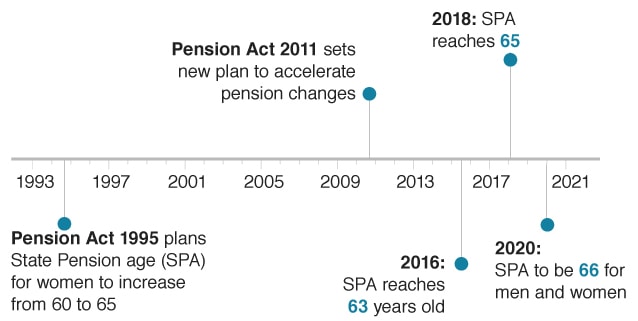Women who claim they have lost money when the government changing their state pension age have suffered another legal setback.
Table of contents
- What’s Next For Women Upset Over Their State Pension?
- What’s The Case About?
- Timeline of pension changes for women born in the 1950s
- What Is The State Pension Age?
- State Pension Age And Retirement
- How The State Pension Age Affect Expats
- Check Your State Pension Age
- WASPI Women State Pension Age Row FAQ
- Related Information
Judges considering their Court of Appeal legal challenge unanimously dismissed their claim.
The case stepped up to the Court of Appeal after the women’s argument that the Department of Work and Pensions was treating them unfairly was rejected in the High Court last year.
Judges reviewing the case decided the government’s move to align the state pension age for men and women was not unlawful discrimination.
“Despite the sympathy that we, like the members of the Divisional Court feel for the appellants and other women in their position, we are satisfied that this is not a case where the court can interfere with the decisions taken through the parliamentary process,” said the ruling.
What’s Next For Women Upset Over Their State Pension?
The only legal option remaining is to take the case to The Supreme Court, Britain’s highest court.
After losing twice in lower courts, lawyers and judges will have to decide if the women have grounds to mount another legal challenge even if they are granted leave for a further appeal.
What’s The Case About?
Julie Delve, 62, and Karen Glynn, 63, of the BackTo60 campaign group say not receiving their state pension at the age of 60 has impacted their retirement finances disproportionately.
Their lawyers told the courts that many women took breaks from work to care for children or relatives and were on lower salaries than men which stopped them saving as much into workplace pensions as men, which hit their retirement finances harder.
BackTo60 reckon changing the state pension age from 60 to 65 years to match men affected nearly 4 million women, with some losing up to £40,000 in state pension payments.
The state pension started paying at the age of 60 for women until 2010 and now matches the 65-yreaar-old minimum age for men and will continue rising alongside the men’s state pension age.
BackTo60 and other campaigners, like the Women Against State Pension Inequality (WASPI), argue they planned to retire at 60 and then found the deadline had shifted and undermined their financial plans.
The worst affected women were born after April 6, 1953.
The government refused to change the law in their favour, saying the measure was signalled at least 10nyears before taking effect, that the move was not discriminatory and compensating women affected by the change would cost £215 billion, which was unaffordable.
WASPI says the row is not over aligning state pension ages for men and women but the way the change was managed, leaving many women without time to make other financial arrangements.
Timeline of pension changes for women born in the 1950s

What Is The State Pension Age?
State Pension Age is the earliest age that men and women can claim their state pension.
You can check your state pension age online here
Don’t forget the state pension age can differ from the age a workplace or personal pension start to pay – which can be as young as 55 years old.
The government has plans to change the State Pension Age – to 67 years old by 2028 and 68 by 2046 to reflect statistics that show people are living longer.
Find out how to claim your UK state pension as an expat.
State Pension Age And Retirement
No one must retire when they reach the State Pension Age.
People can work for as long as they want, giving up before their State Pension Age or carrying on after.
The Default Retirement Age, which forced workers to retire at 65 years old, is no longer in force, but employers cannot be forced to keep older workers on.
Some jobs still have a compulsory retirement age, like the fire service or jobs that need certain levels of physical fitness.
How The State Pension Age Affect Expats
The State Pension Age is the same for expats as for everyone in the UK.
Changes in the date when someone can claim their pensions are the same. The main difference is the amount of pension paid.
In many countries without a social security agreement with the UK, expats have their state pension frozen at the level of the first amount.
For example, a British expat in Australia reaching the UK state retirement age can expect a maximum payment of £175.20 a week. The payment stays at this level unless they move back to the UK.
However, a British expat in the USA reaching state retirement age on the same day will also expect a maximum payment of £175.20 a week, but because the USA had a social security treaty with the UK, the payment is uprated in line with the cost of living in Britain each year.
Countries where the UK state pension is uprated each year
Check Your State Pension Age
Men and women approaching retirement can find out how much state pension that they are likely to get with a free online calculator on the Department of Work and Pensions web site.
WASPI Women State Pension Age Row FAQ
The row over changing the state pension age for women is likely to rumble on, but here are some answers to the most asked questions about the upset.
The changes to state pension age were first disclosed by the Labour government in 1995 and contained a clause raising the age for women from 60 to 65 years old, which meant many women would have to wait an extra six years before receiving any payment.
WASPI and BackTo60 say they represent around 750,000 of the 3.8 million women born in the 1950s who are affected by the state pension age change for women.
The change in the state pension age does not affect men, only women. Until 2010, women received their state pension at 60, but the new rules escalated that age to 65 in line with men over a short period.
No. Their state pension age now matches that for men and any future hikes impact both genders equally.
Related Information
Below is a list of related articles you may find of interest.
